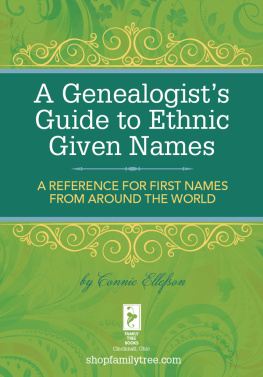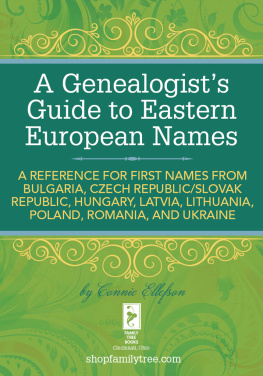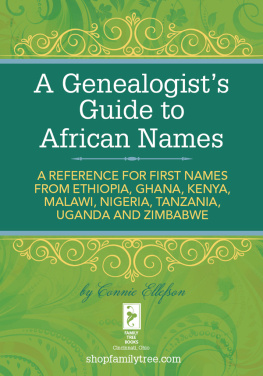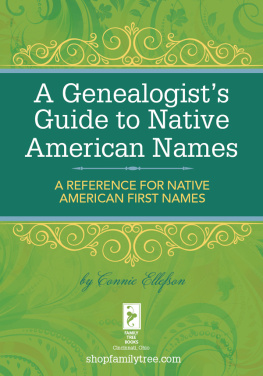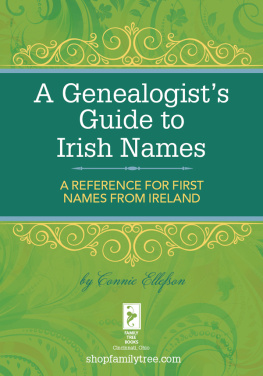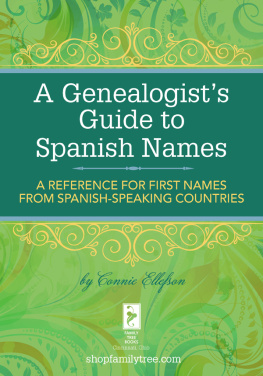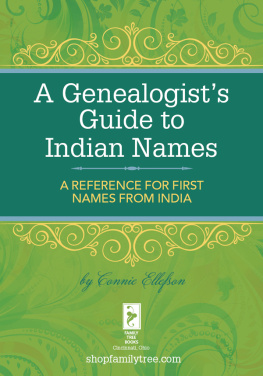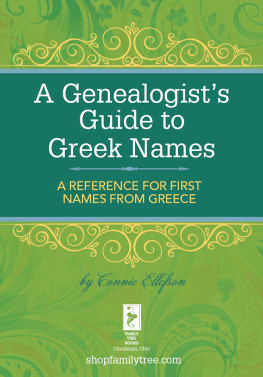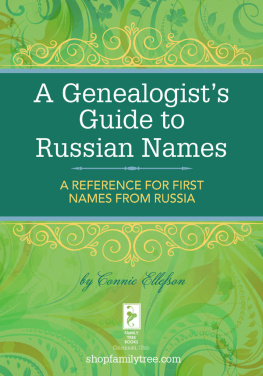A Genealogists Guide to Ethnic Given NamesA REFERENCE FOR FIRST NAMES FROM AROUND THE WORLDby Connie Ellefson
Cincinnati, Ohio shopfamilytree.com
Part One Europe
Basque Region
According to an old French saying about the Basque people of the Pyrenees (northern Spain and southern France), One who speaks Basque speaks Catholic. Indeed so strong is the Catholic influence that Jeanne dAlbert, a Protestant missionary working in the Middle Ages, was said to have converted only eleven people in the Basque region, although he was much more successful in neighboring areas. Today some eighty thousand students are learning Basque. It is typical of the independent nature of the Basques that forty years of repression were quite unable to stamp out their culture in any significant way.
History
A look at the emigration pattern from Spain shows a fascinating fact. from Spain is from the Basque provinces and Catalonia, another Spanish province. from Spain is from the Basque provinces and Catalonia, another Spanish province.
Basque immigrants have been in the New World for hundreds of years. At least four sailors and perhaps a captain in Columbuss entourage were Basque. Basque mercenaries fought with Corts in his conquest of Mexico, then later moved north into what is now New Mexico. They started the first European colony in the Southwest in 1598. When the California Gold Rush occurred in 1849, Basques were there and soon began raising sheep and cattle to feed miners when the supply of gold proved to be less than expected. From California, Basque shepherds gradually spread from the coast to settle eventually in twelve western states.
They became the backbone of the long-flourishing sheep-raising industry. Large numbers of Basques also immigrated during the 1900-1920 period, settling primarily in the Rocky Mountains. So renowned were the Basque shepherds that in the 1950s, special laws were passed to let Basques enter the U.S., despite immigration quotas, when there was a shortage of shepherds. A little over five thousand herders immigrated under this law between 1957 and 1970. However, rising wages in the Basque homeland as well as increased work opportunities in Peru, Mexico and southern Spain appear to have brought the Basque immigration to an end.
Naming Traditions
Recent travelers to the Basque region say the Catholic influence is still strong.
A girl might be named Mate Jose (Mary Joseph), and a boy might be named Jose Mate (Joseph Mary). A glance at the Basque name list shows numerous references to the Virgin Mary. Each of these are the local versions of Our Lady of __________from the different towns and regions of the Basque area. However, there is definitely a trend there today to give older, purely Basque names to babies. This trend is part of the growing movement toward Basque separatism, which has gained momentum since 1978 when a forty-year-old prohibition against teaching the Basque language and culture was lifted. It had been dictated by President Franco as punishment to the Basque people for siding against him in the Spanish Civil War.
The nature of the Basque language itself is also a tribute to the enduring nature of the culture. Scholars are unable to determine any relation between the Basque language and any other language in the world, concluding it is a very primitive language that has survived thousands of years without being supplanted. Even the Romans were unable to stamp it out and even appear to have given up on invading the region altogether. Basque pronunciation is similar to Spanish, except that each syllable is supposed to be pronounced with the same emphasis, and there are some letter combinations with unexpected pronunciations.
Pronunciation
a = ah as in ball e = eh as in late i = ee as in keep o = oh as in hope u = oo as in oops x = sh as in share j = h as in hope or y as in you tx = ch as in church tz = ts as in rats ts = tch as in itch
Basque Female Names
Abarrane (H) feminine for Abraham; father of a multitude; Abarne
Agate (Gr) good or kind
Agurtzane (Ah-goorts-ah-neh) reference to the Virgin Mary
Ainhoa (ah-een-o-ah) reference to the Virgin Mary
Aintzane (ah-een-tsah-neh) glorious
Aitana (Port.) glory
Aitziber (ah-ee-tsee-behr) reference to the Virgin Mary
Alazne (ah-las-neh) miracle
Alesandese (Gr) feminine for Alexander; defender of mankind
Aloa (ah-lo-nyah) reference to the Virgin Mary
Amaia end
Amalur motherland
Amarande (Gr) immortal, flower name
Anamari (H) grace; Ana Maria
Andere feminine for Andrew
Andonie (ahn-do-nee-nyeh) (L) beyond praise; Andone
Ane (H) grace
Apirka (Gael) pleasant
Arama reference to the Virgin Mary
Arene (Gr) very holy one
Argi light
Arrate (ahr-rah-teh) reference to the Virgin Mary
Arrosa (L) rose
Aurelne (L) gold
Aurkene (ah-oor-keh-neh) feast of the Presentation
Bakarne solitude
Balere (bah-leh-reh) (L) strong
Begoa (beh-go-nyah) reference to the Virgin Mary
Bibie (bee-bee-nyeh) (L) lively
Birkita (Celt) strength
Bittore (L) victorious
Bixenta (bih-shen-tah) victorious
Catalin (Gr) pure
Danele (H) God is my judge
Deiene (Span) feast of the Annunciation;Deikun, Deina
Delbin (Gr) flower name, dolphin
Dominica (L) of the Lord
Donata (L) gift
Dorbeta (dor-beh-tah) reference to the Virgin Mary
Dorote (do-ro-teh) (L) gift of God
Edurne (eh-door-neh) snow
Eguskie (eh-goo-skee-nyeh) sunny
Ehunate (eh-oo-nah-teh) reference to the Virgin Mary
Elisa (H) consecrated to God
Elizabete (H) consecrated to God; Elisa
Erdotza (ehr-do-tsah) reference to the Virgin Mary
Errita (Gr) from Margarita; Irta
Errukine (eh-roo-kee-neh) merciful
Eskarne (ehs-kar-neh) (Span) merciful
Espe (ehs-peh) (L) hope
Estibalitz (ehs-tee-bah-leets) reference to the Virgin Mary
Floria (L) flower; Florella, Floris, Florica, Flori, Lore
Garabi (L) clear; Garbi, Kalare
Garaitz (gar-ah-eets) victorious
Garbie (gar-bee-nyeh) (Span) purification
Gardotza reference to the Virgin Mary
Gechina grace
Gildas (Celt) servant of God; Kermeilde
Gizane (gee-sah-nee) Incarnation of Christ
Godalupe (Span) reference to the Virgin Mary,valley of the wolf
Gorane (go-rah-neh) (Span) Holy Cross
Gotzone (go-tso-neh) angel, messenger
Graciana (L) graceful
Idoia (ee-doy-ah) reference to the Virgin Mary
Idurre (ee-doo-reh) reference to the Virgin Mary
Igone (ee-go-neh) ascension
Ikerne (ee-kehr-neh) visitation
Irati fern field
Iratze (ee-rah-tseh) reference to the Virgin Mary
Next page
